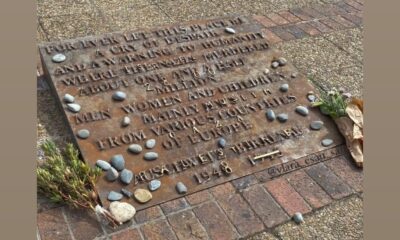
Featured Item

End of an era dawns with passing of three survivors
Published
4 years agoon
By
Nicola MiltzAs the ambulance was about to whisk him away to hospital, Holocaust survivor Henri Meenz watched his beloved wife kiss the mezuzah on their front door imploring him to get well and return to her.
Sadly, Henri, who had been ill for a while, never returned. He passed away last Shabbos of complications from COVID-19 leaving his wife, Claudie, to sit shivaalone in quarantine as she recovers from the virus.
“I never got to say goodbye to my love. I had to keep my distance. The future seems so bleak, the pain is so severe. He was my everything,” she said.
Henri brings to three the number of precious Holocaust survivors who have passed away since the lockdown regulations plunged the country into a new reality. Two of them may not have contracted the virus, but were nonetheless severely impacted by it because they were elderly, vulnerable, and had to endure months of loneliness and isolation.
One (Henri) was a little boy when he spent three years in harsh conditions in a camp in Toulouse, France, with his parents and older brother. Another was hidden in a farmer’s barn in Lithuania, and a third survived in hiding in Lithuania before being deported to Tempelhof camp.
Henri Meenz, 90, Ascia Lieberman, 86, and Judith Mandelberg, 102 (approximately), all lived through the atrocities of World War II, and are no longer with us to share their eyewitness accounts, having taken their poignant stories of survival, courage, and faith with them.
Tali Nates of the Johannesburg Holocaust & Genocide Centre (JHGC) told the SA Jewish Report this week, “We are heartbroken about the passing of three of our dear Holocaust survivors. It’s especially difficult during lockdown as we can’t be there physically to see the survivors who played such an important role in all our education programmes, and of course can’t support their families and loved ones.”
Lieberman passed away peacefully last week at a care home for the elderly. She was born in Lithuania in 1934, and according to her family, had a happy childhood. After the German occupation in 1941, her family was interned in the ghetto. Her mother and older sister, Mina, were murdered. Seven-year-old Ascia, her father, Wolf, her older sister, Sonja, and younger brother, Josef, were hidden in the barn of Lithuanian farmer Juozas Markevičius until the end of the war. Markevičius was later recognised by Yad Vashem as a Righteous Among the Nations.
“I followed her last breath on Facetime,” said her grieving daughter, Doris Bloom, from Copenhagen, Denmark.
“A wonderful nurse held her and guided me through her last moments. She had a small funeral with our closest family while many others watched via Zoom. It was surreal.
“The lockdown took its toll on my mother. She decided to close her eyes and not look out anymore.”
After the war, Ascia settled in Johannesburg. According to those who knew her, she was “a beautiful woman inside and out”.
She was artistic and poetic, and an active member of the Johannesburg Holocaust survivor group until she became too ill to join. Her inspiring story is part of the JHGC’s permanent exhibition. She is survived by her three daughters, Genena Lurie, Doris Bloom, and Rosalie Bloom, and four grandchildren.
“Our mother never spoke about the war until much later in her life,” said Doris, “My husband, daughter, and I took her to Lithuania in 2003, where we said kaddish for her late mother and sister near a mass grave in the forest where they were buried. It was the first time she had been back since childhood, and she was able to close the circle of pain and memory.”
Judith Mandelberg was born in Anikst, Lithuania. She survived in hiding, and was then deported and later liberated from Tempelhof camp.
She met her Polish husband, Moshe Mandelberg, at a displaced persons’ camp in Germany after the war. They had a stillborn child in Germany, and later had two children when they settled in South Africa, coming here with nothing but the clothes on their back.
According to her grandson, Ari Mandelberg, with whom she lived until her death, she always wanted to be buried next to her husband in Israel where there is a space reserved for her.
“Sadly because of COVID-19, this wasn’t to be. However, she’s buried next to my father, Rabbi Yehuda Mandelberg, and one day we hope to take her to Israel.”
“Judith was known by everyone as ‘bobba’,” said Ari. “My grandparents celebrated being alive although the war was always with them. They had survivors’ guilt after losing many loved ones during the war. But they carried on, and lived meaningful lives.”
Judith was described as a warm and generous woman, as well as being a superb chess player and teacher. She was dedicated to her family, and was a regular supporter and attendee of the Holocaust survivor group. She is survived by five grandchildren and many great-grandchildren.
Henri Meenz was born in Antwerp, and was 10 years old when he, his parents, and brother lived in a labour camp in France. Many of his family perished in the Holocaust, but Henri and his immediate family survived. Up until the lockdown, Henri loved meeting his brother, Louis, 96, for coffee.
“They loved seeing each other,” said Claudie, “but the virus kept them apart. Instead, they would phone each other regularly and reminisce, but they missed seeing one another. Henri was the most kind, caring, and gentle man. I’m not ready to outlast him.”
“It feels as if we are getting closer to the end of an era of Holocaust survivors sharing their first-hand testimonies with us, and cherish the survivors who are thankfully with us, hopefully for many more years,” said Nates. We wish the families of Judith, Ascia, and Henri a long life, and may their memory be of blessing to us all.”










